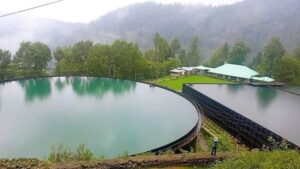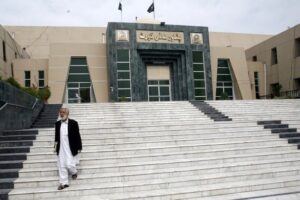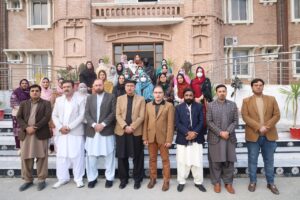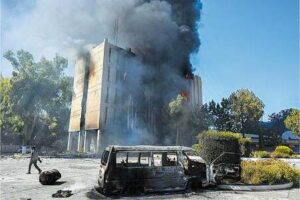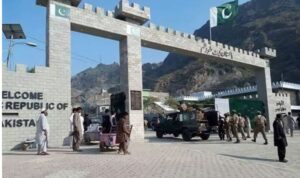PESHAWAR – The streets of Tank and South Waziristan on 4 October witnessed a united front of lawyers locking the doors of local courts and record rooms in protest. Their grievance? The Peshawar High Court’s (PHC) decision to relocate the judicial system from these regions to Dera Ismail Khan due to escalating security concerns. In what the lawyers argue is not merely an administrative shift, but a move that signals the beginning of the state’s withdrawal from the area, the protests have sparked debates on governance, security, and the future of justice in this fragile region.
A Judiciary Under Siege
The orders to transfer the courts to Dera Ismail Khan came from the PHC, citing the deteriorating security situation. But for the people of Tank and South Waziristan, this decision is viewed as a blow to their access to justice. Many here are too poor to afford the additional expenses of traveling to another district. The legal community has responded with swift and resolute action, spearheaded by the Tank District Bar President, Pir Abdul Ghaffar Shah, and South Waziristan Bar President, Advocate Sherpao Mehsud.
In their eyes, this is not just about courts moving—it’s about the erosion of government authority. “This is not a question of moving the courts; it’s about abandoning an entire population to lawlessness,” Mehsud told reporters after a heated joint meeting of both bar associations. His frustration was palpable. “The people here are already suffering, and now they are being forced to go to another district to seek justice? This is unacceptable. We will not let this happen.”Indeed, the protests represent more than a pushback against judicial relocation. They are a manifestation of deeper fears about the future of governance in a region that has long been a battleground between state forces and militant groups. By moving the courts, many fear the government is signaling that it can no longer protect or serve the people of Tank and South Waziristan.
Also Read: Peshawar High Court Summons Chief Secretary Over Police Firing on PTM Gathering
A Precarious Security Situation
The justification for relocating the courts stems from an undeniable reality: the security situation in South Waziristan and Tank is dire. Armed groups, criminal networks, and militants have held sway over this territory for years. The increasing frequency of targeted attacks on government officials, police, and even private institutions like banks has made the area increasingly ungovernable. Cash vans have been ambushed in broad daylight, forcing several banks to close their branches and relocate staff to settled districts of the province.
While this decision may be rooted in security concerns, it also raises troubling questions about the government’s ability—or willingness—to enforce its writ in these areas. The absence of courts could open the door for a return to traditional justice systems like the Jirga, which, while culturally significant, are often seen as less impartial and more prone to corruption than formal legal institutions.This withdrawal is not isolated. Government offices and institutions have been gradually pulling out of these regions for years. Public services are minimal, and state representation is increasingly symbolic.
The relocation of courts feels like the final retreat, a tacit admission that the government has failed to maintain control. For the people of South Waziristan, it feels like abandonment.A Larger RetreatThe situation in Dera Ismail Khan, Tank and South Waziristan is emblematic of a larger problem. Across Khyber Pakhtunkhwa, particularly in its border areas, law and order have collapsed. Extortion rackets and the movement of armed militias are commonplace, in stark contrast to the relative calm just across the provincial border in Punjab.
In towns like Bhakkar and Mianwali, peace and stability prevail, creating a puzzling and frustrating dichotomy for residents in these troubled Districts. How can such vastly different realities exist just across an invisible border?This question lies at the heart of the lawyers’protest. By relocating the courts, the government risks widening the already glaring divide between Khyber Pakhtunkhwa’s troubled areas and the more peaceful districts of Punjab. The lawyers see this move as a step toward the total exclusion of Tank and South Waziristan from the province’s administrative framework. Once the courts are gone, what’s left of state control?
Also Read:
Multiple Districts Urge Provincial Government to Halt Foreign Tourist Arrivals
The Consequences of Inaction
The dangers of this gradual retreat are not lost on those observing from afar. In Swat, similar conditions prevailed for years, with militants controlling large portions of the territory and imposing their version of justice. However, there, a concerted effort by local communities and security forces eventually curbed the influence of extremists, allowing for a fragile peace to take hold. In South Waziristan, no such efforts are being made.
There is no large-scale military operation, no collaboration between paramilitary forces and police to restore order. The silence from the government is deafening.The absence of a strong response to the deteriorating security situation raises serious concerns. If the courts are relocated without any parallel efforts to stabilize the region, it will set a dangerous precedent. Lawless regions without formal legal structures are prime breeding grounds for extremist groups. Militants and criminals alike thrive in the absence of government oversight. In such an environment, local people will have no choice but to turn to non-state actors for dispute resolution, further weakening the government’s already tenuous grip on the area.
A Matter of Survival
For the residents of Tank and South Waziristan, this is more than a legal or political issue—it”s a matter of survival. The people here have long endured the consequences of being on the periphery of both the state and society. Militancy, poverty, and displacement are daily realities. The courts, fragile as they are, represent a thin but vital link to the government. Removing them severs that link, leaving the people more vulnerable than ever before.
The state’s gradual retreat could force the local population to resort to age-old mechanisms like the Jirga to resolve disputes. However, these traditional systems are not equipped to deal with the complex legal and security challenges facing the region today. They also risk being co-opted by the very militant groups that have long sought to impose their version of justice on the local population. In essence, by removing formal courts, the state is ceding the ground to non-state actors who will happily step in to fill the vacuum.
Also Read:
Peshawar High Court dismisses ANP s petition on‘resettlement of terrorists’
A Government on the Defensive
The government’s response to these concerns has been, at best, lackluster. There has been a strong opposition to large-scale operation to restore order or even of enhanced security measures for judicial staff. In fact, the decision to move the courts is seen by many as a sign that the government is no longer interested in maintaining its presence in the region.Yet, this retreat is not without consequences. By ceding control of these areas to non-state actors, the government is effectively handing over its authority to the very groups it has been fighting for years. This sets a dangerous precedent—not just for South Waziristan and Tank, but for other regions facing similar challenges. Once the state begins to withdraw, it becomes increasingly difficult to reassert its authority. Lawlessness begets more lawlessness, and the longer the government waits, the harder it will be to regain control.
The Way Forward
As the protests continue, the path forward for South Waziristan and Tank remains uncertain. The government faces a stark choice: either it reasserts its authority through force and administrative action, or it allows the region to fall further into chaos. The lawyers’ protest is a call to action—a plea for the government to take responsibility and protect its citizens, rather than retreating in the face of adversity.The solution lies not in relocating courts or withdrawing state institutions, but in strengthening them.
The provincial government must take immediate steps to restore order, including deploying security forces to protect judicial staff and institutions. At the same time, it must work to address the root causes of instability in the region—poverty, displacement, and the lack of economic opportunities. Only by addressing these underlying issues can the government hope to bring about lasting peace.For now, however, the people of South Waziristan and Tank wait anxiously.
Their fate hangs in the balance, as the government weighs its options. Will it choose to protect its citizens and uphold the rule of law? Or will it continue to retreat, leaving the region to fend for itself in an increasingly dangerous world? The answer may well determine the future of not just South Waziristan, but the entire tribal belt of Khyber Pakhtunkhwa.



